|
Knoxville, TN
MCAS Cherry Point, NC
Saint Louis, MO
CFB Trenton, ONT
Thunder Over Michigan, Bellevue, MI
Marion, IN
Waukegan, IL
NAS Patuxent River, MD
MCAS Cherry Point Air Show
Warbird
Photo Review
Warbirds at Marine Corps Air
Station Cherry Point,
Havelock, NC - April 29-May 1, 2016 (Photos
taken Saturday, April 30.)
An Airshow of "Firsts."
I am often questioned why I continue
to visit airshows; and in some cases the same ones on a regular basis. After all, there are limited airshow acts and warbirds, and they do the same thing from week to week
and show to show. This assumes that the aviation industry and airshows
don't ever have anything new or different. MCAS Cherry Point 2016
is a prime example of a show that had some aircraft that were new, and
also where the presentation of some of the existing acts was new to me.
There were many "Firsts" at Cherry Point for me.
The show was also the show of gray on gray,
with many gray camouflaged military aircraft, and low gray clouds for
most of the
day. There is just not that much color in the photos of the show.
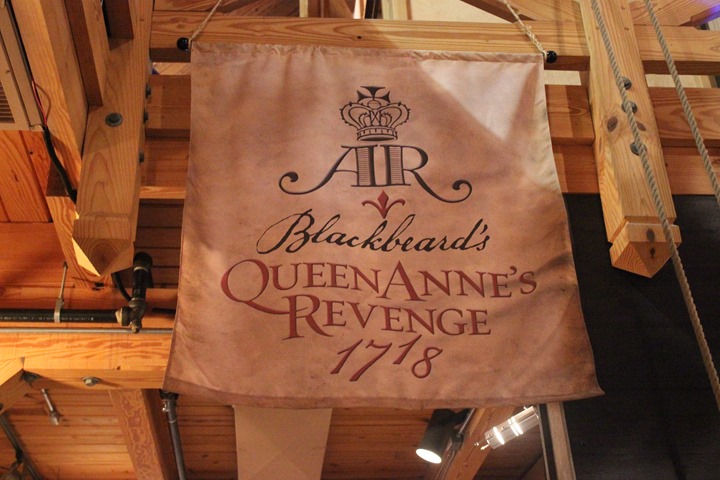
What does Blackbeard's ship, the Queen Anne's
Revenge, have to do with the 2016 MCAS Cherry Point Airshow? Three
weeks before the show, I discovered that relics of the pirate's ship were
located in the North Carolina Maritime Museum in Beaufort, twenty
miles down the road from Cherry Point. Cherry Point had not been
on my original list of shows to visit for 2016. A quick look at the airshow lineup convinced me I now had more than one reason to visit the
area and take in the show. It had an outstanding line-up of acts.
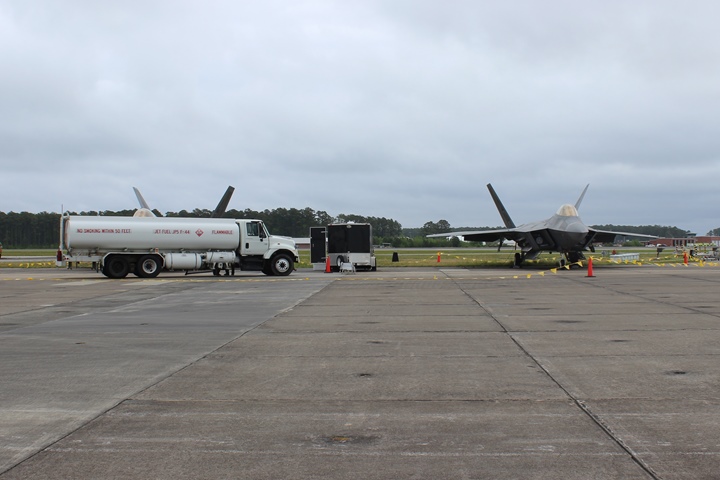
This was a first for me. The F-22 Demo
team staged directly in front of where I was going to watch the show.
While I have seen the demo numerous times, I have never been in a
position to watch and hear the start up. Normally
the F-22s are off on a remote ramp away from the crowd. Cherry
Point does it right!
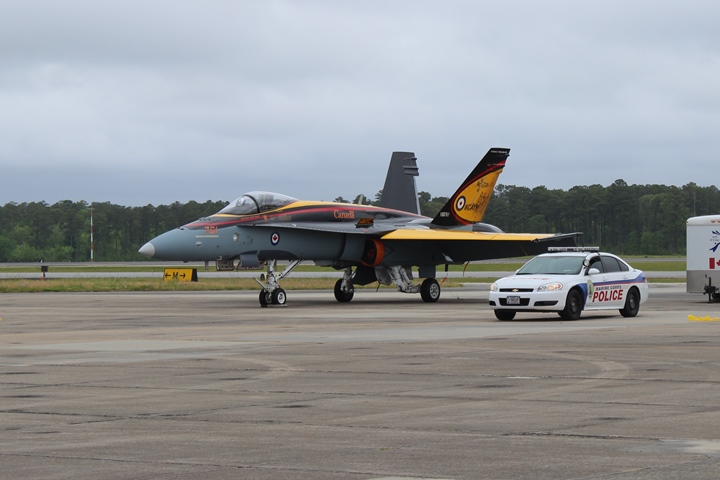
Parked right next to the F-22s was the
Canadian CF-18 Demo. This is the also the first time I have been
able to sit across from this aircraft at a show.
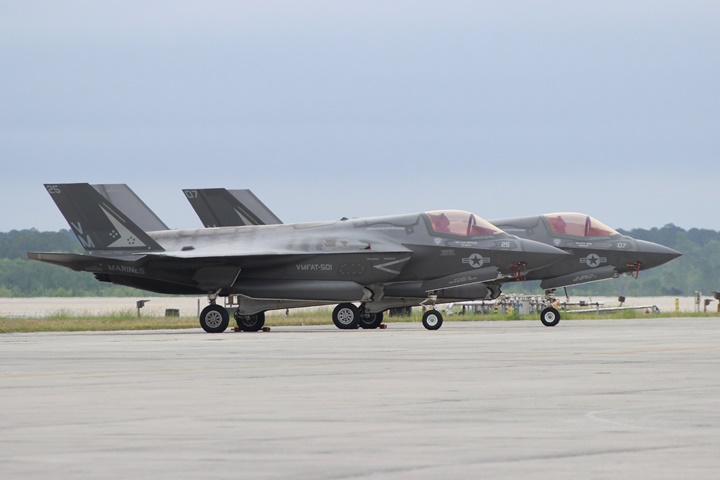
Two F-35B were on the ramp to my right. This is the first time I
have seen the B-version, and the first time I have seen more than on
F-35 in one place at one time. It was the listing of the F-35s in
flying section of the Cherry Point Airshow listing that convinced me to attend this event.
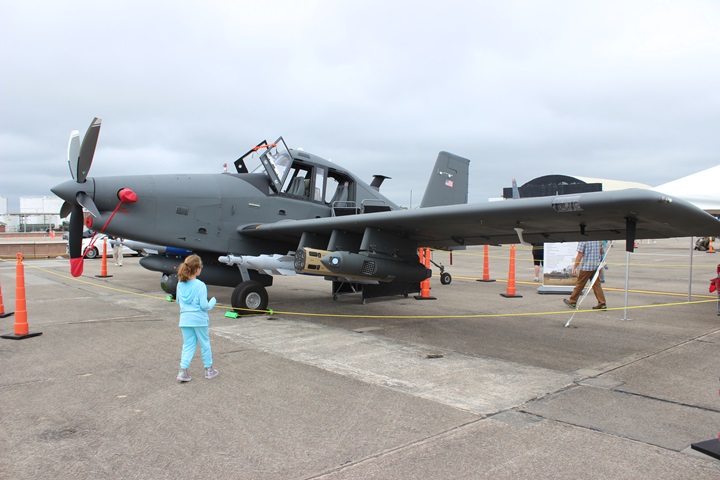
Right behind my sitting position at the show was this Iomax Arch Angel
on static display. This was a first for everyone at the show, as
this was the first time the Arch Angel has been placed on display at an airshow.
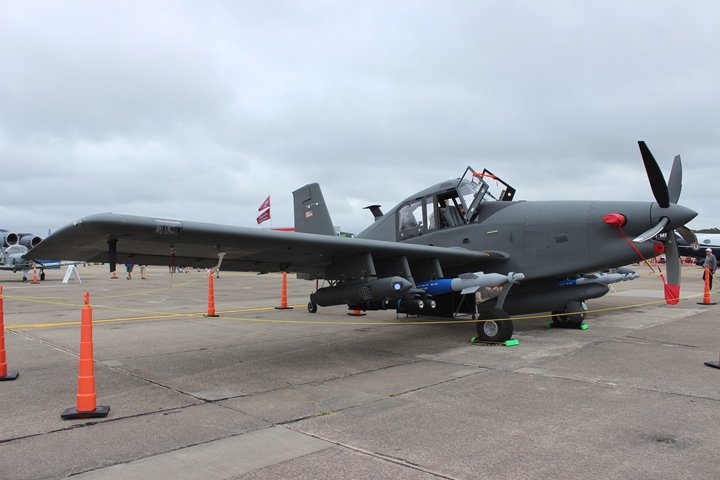
The Arch Angel is a two-seat version of the Thrush S2R-600, normally used
as a crop duster. Iomax has modified the aircraft for long range
intelligence, surveillance, reconnaissance and standoff precision strike
missions. This particular aircraft is number ten of twenty-five
being sold to the U.A.E.
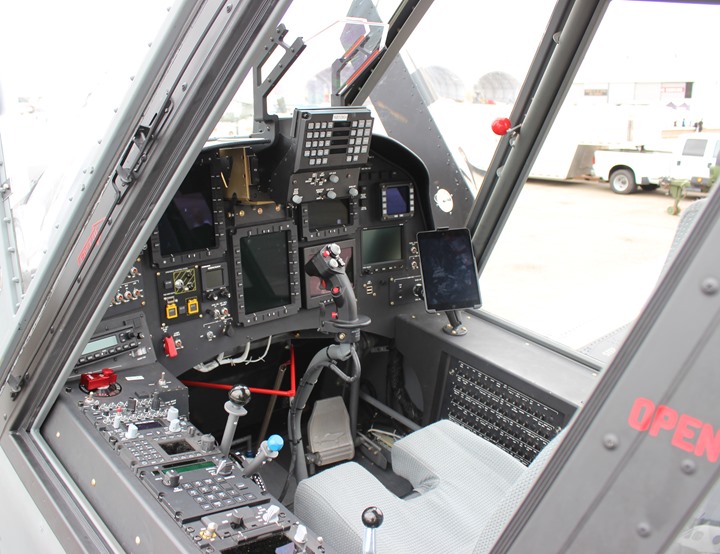
The pilot's cockpit. When the aircraft
arrived at Iomax, it had basic flight instruments, a control stick and
throttle. Iomax has rebuilt the cockpit to this advanced
configuration.
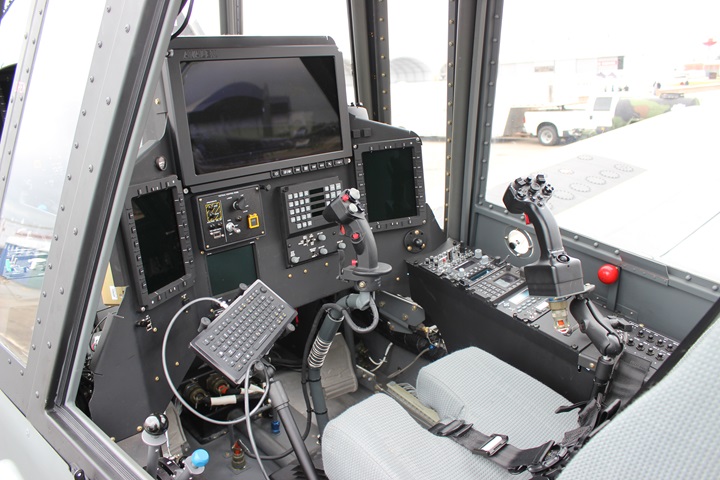
The fuselage as been modified by the
addition of a rear cockpit for a weapons system operator. It also has a control
stick and throttle.
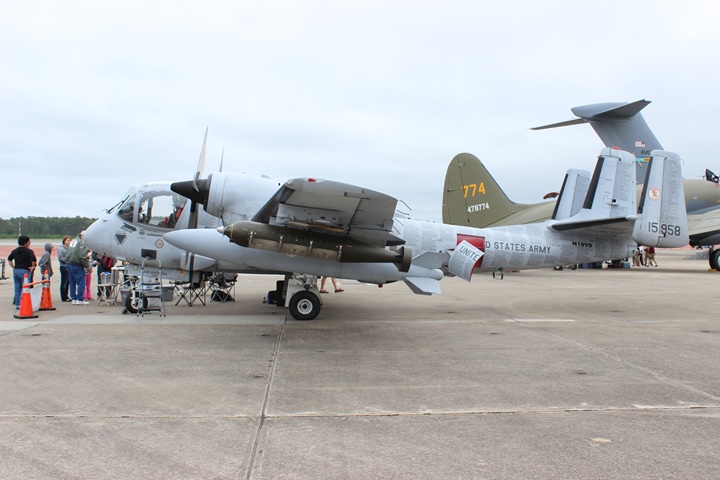
This OV-1D is operated by Mohawk Air Shows;
and is the only OV-1 that performs aerobatic maneuvers. MCAS
Cherry Point was the first time I would see if fly aerobatically.
The paint job was also new since I saw it last.
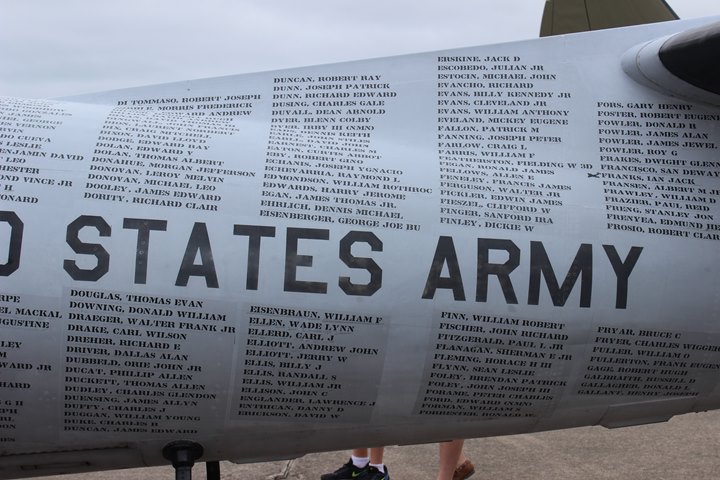
The pilot has had the names of MIAs painted
on the fuselage since I last saw it.
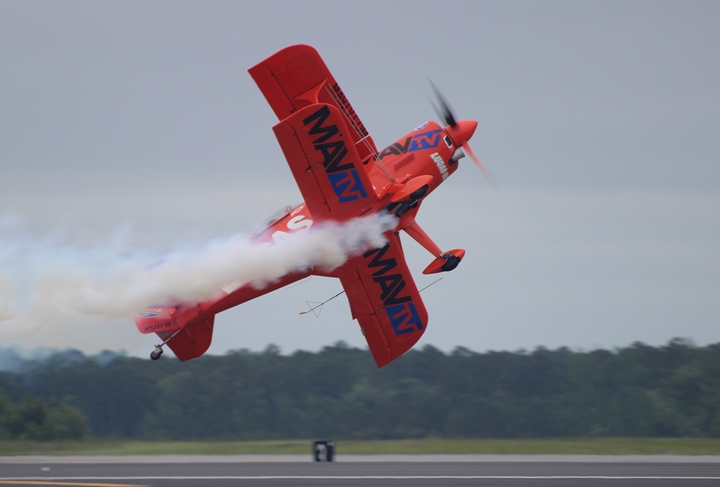
After a weather delay of about an hour, the
flying portion of the show started. Low ceilings cancelled the B-2
fly-by and all of the jump acts for the day. Mike Wiskus
opened the show, as there was finally enough ceiling for the small
aerobatic aircraft to perform.
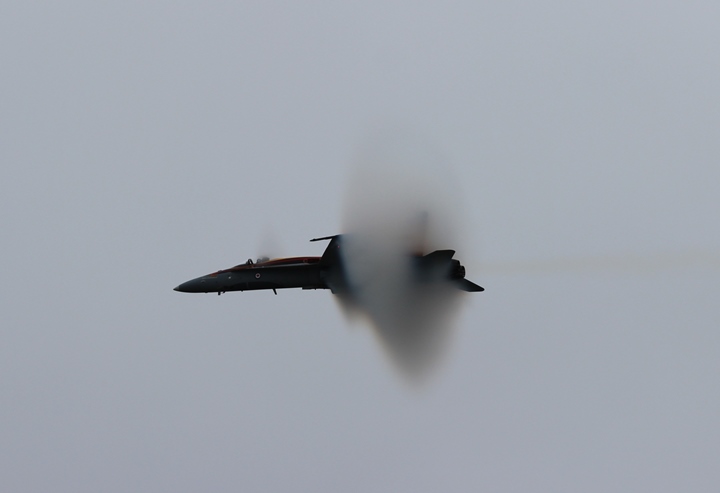
The CF-18 did his low show, but gave the
crowd several vapor passes.
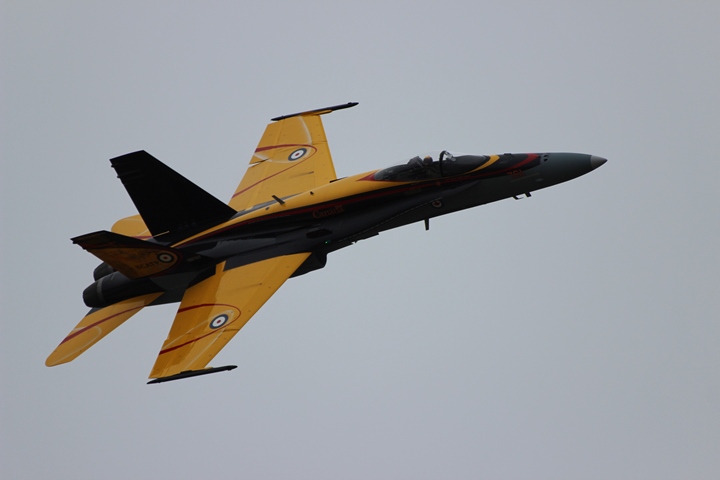
The Canadians had the most colorful of the
modern aircraft on the field.
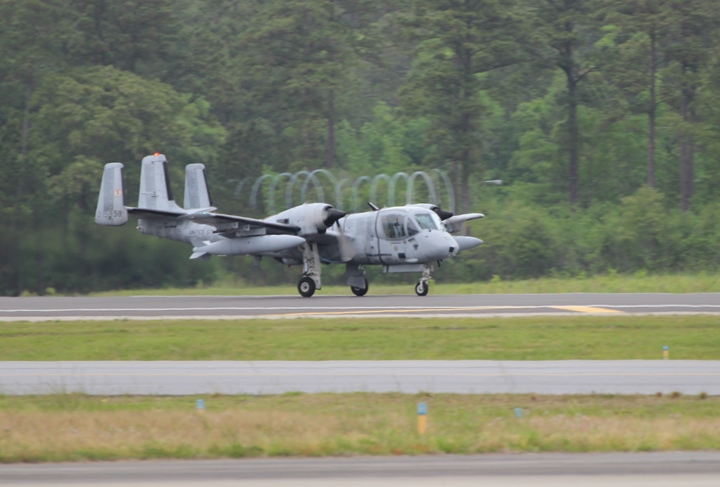
The OV-1D had vapor trails off the tips of
the props as it started its take-off roll.
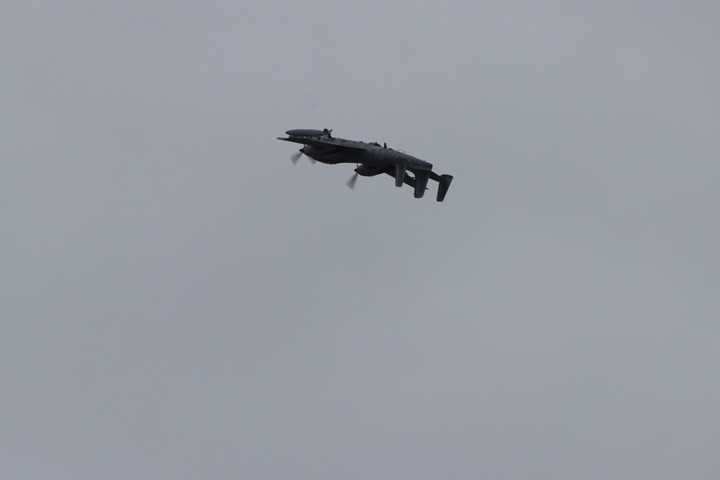
This was the first time I ever saw a
Mohawk do a roll.
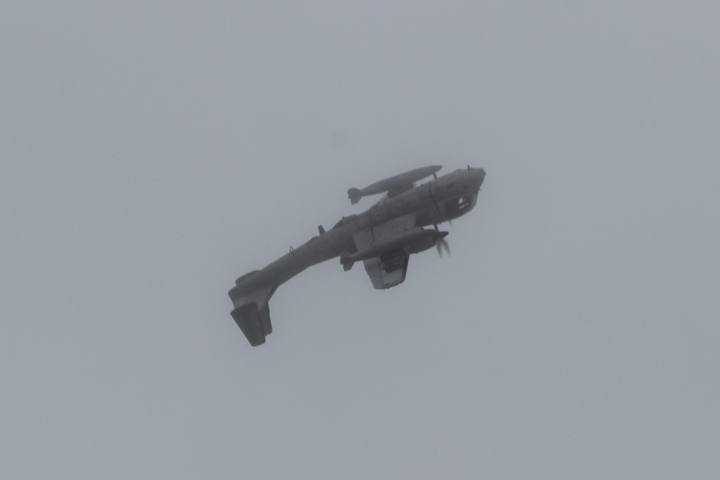
On this aileron roll coming back in the
opposite direction, it was pushing the limits of the low ceiling.
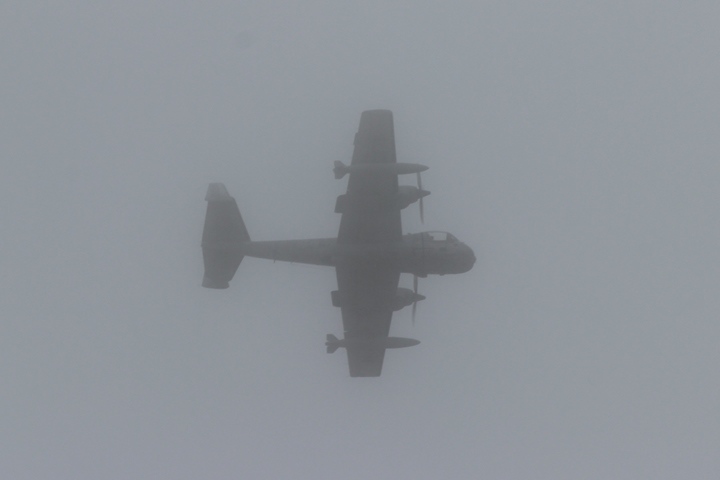
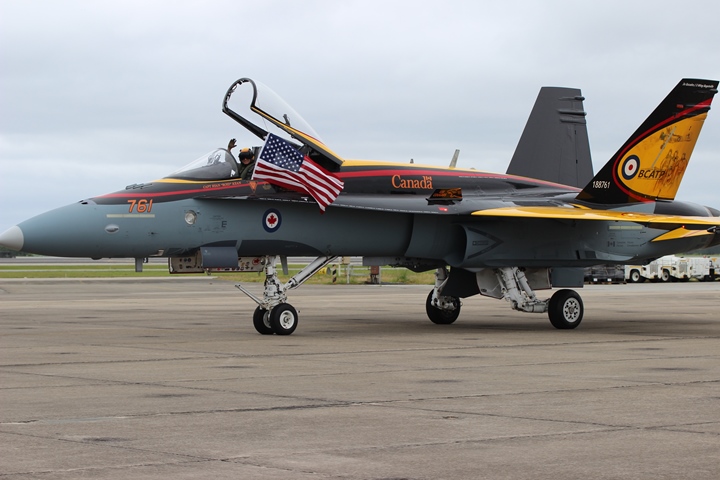
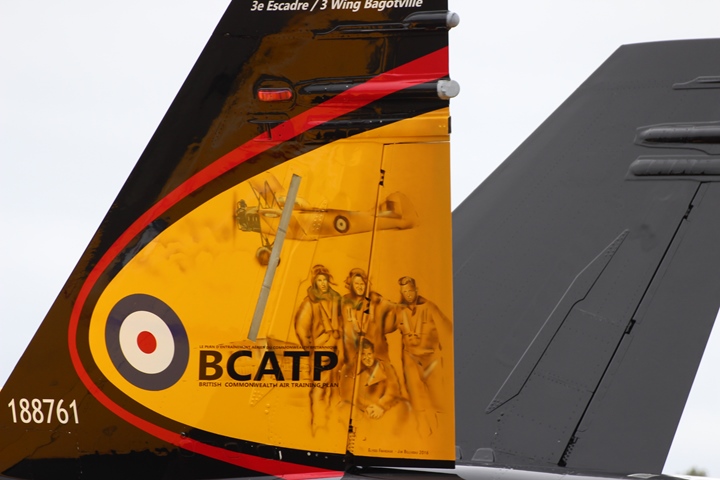
Each year the CF-18 gets a different paint
job to celebrate some event in Canadian history. For 2016 the
event is the British Commonwealth Air Training Plan from WWII.
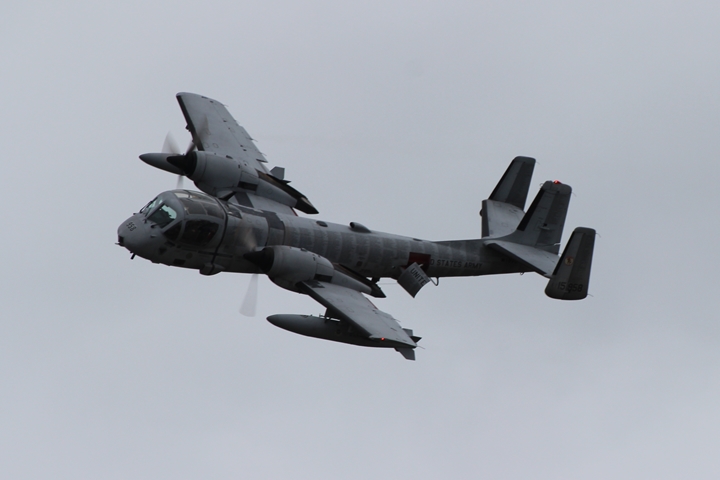
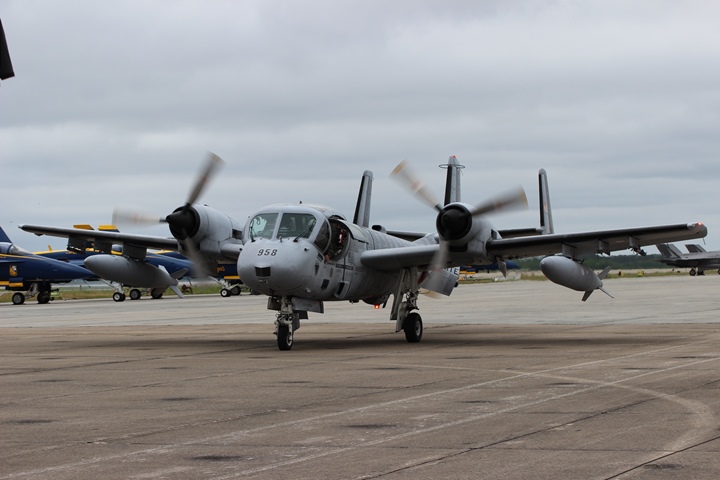
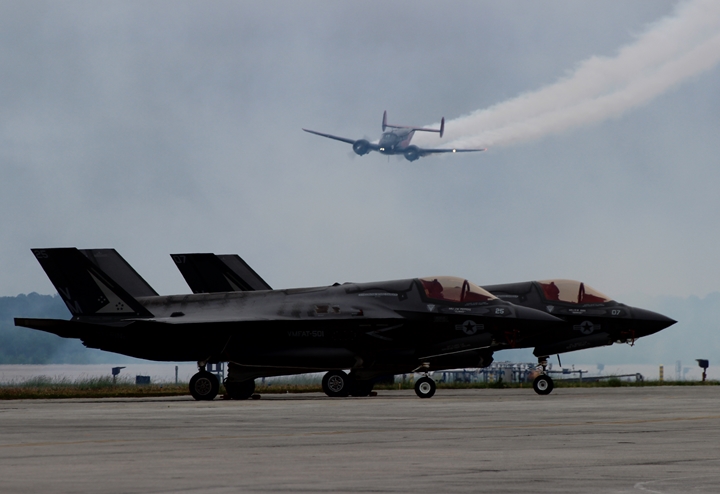
Matt Younkin with the F-35Bs in the
foreground.
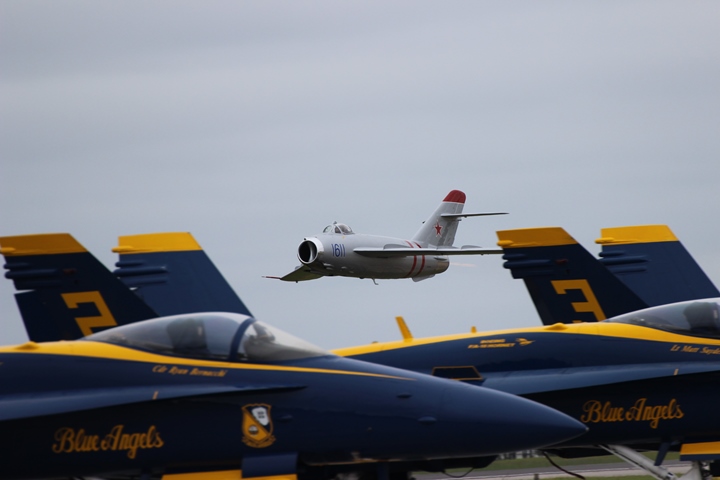
Randy Ball likes to fly the Mig-17 fast,
down low, and with the afterburner on.
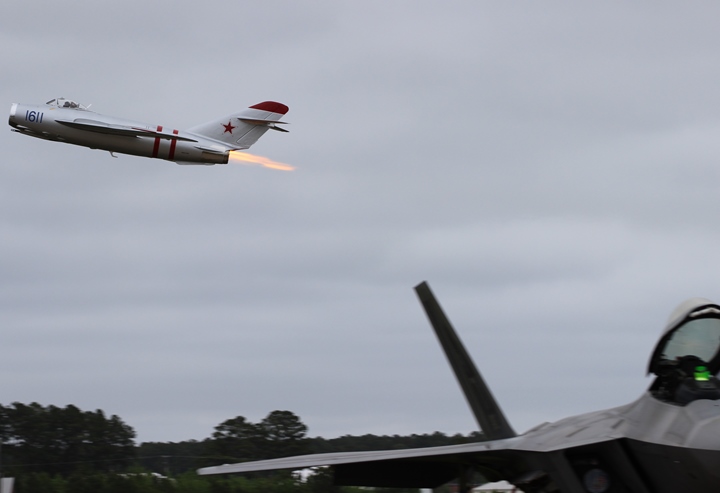
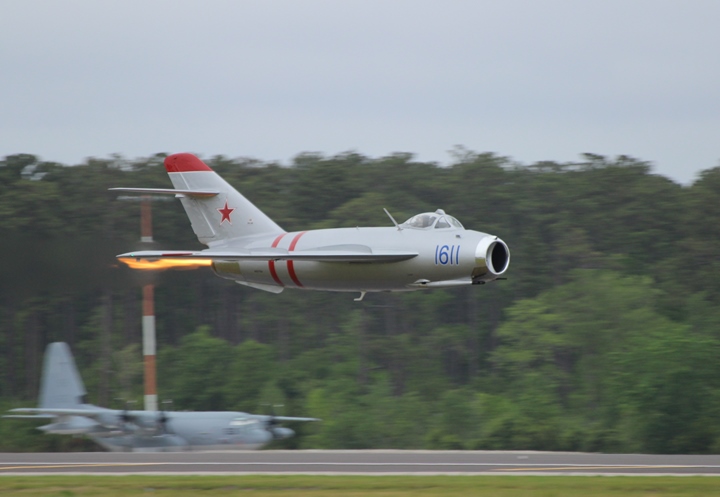
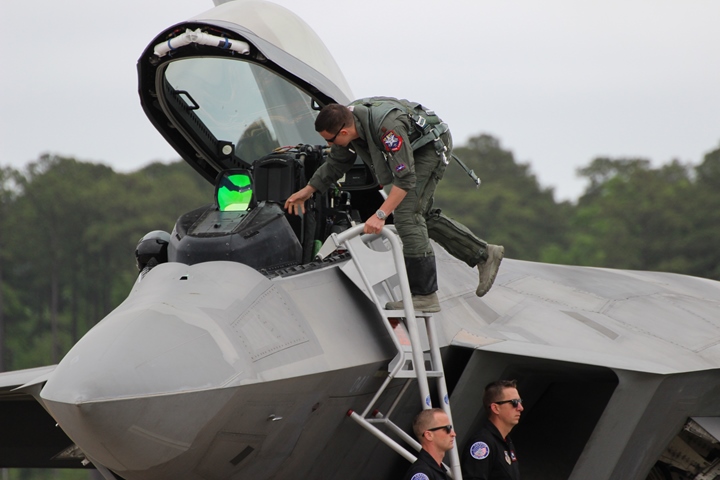
Time for the F-22 Demo, as the pilot gets into the cockpit. The
green of the HUD adds a little color to the gray of the aircraft and
the sky. Note that sunglasses are part of the uniform, whether the sun
is out or not.
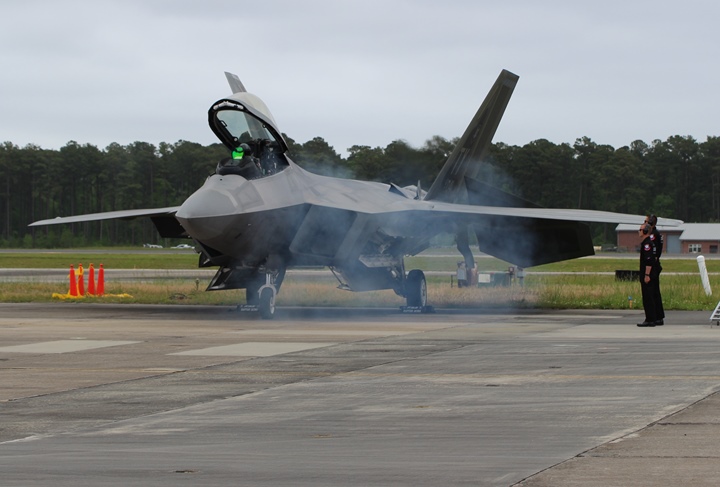
This was a surprise! I was not
expecting any smoke on start-up.
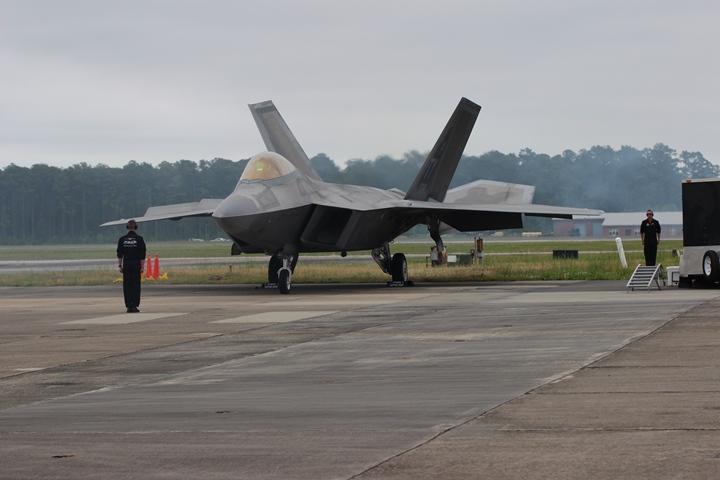
Pre-flight checks of the flight controls
allowed the spectators to see the different configurations as
the pilot went through his check list.
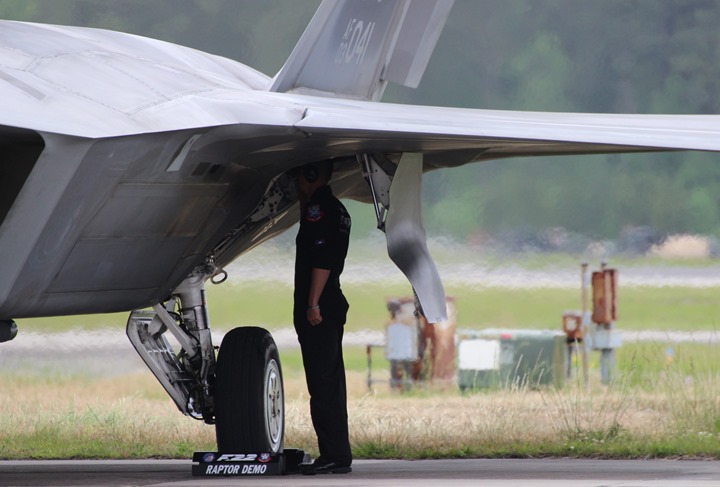
I assume there are some gauges or indicator
lights that are being checked out.
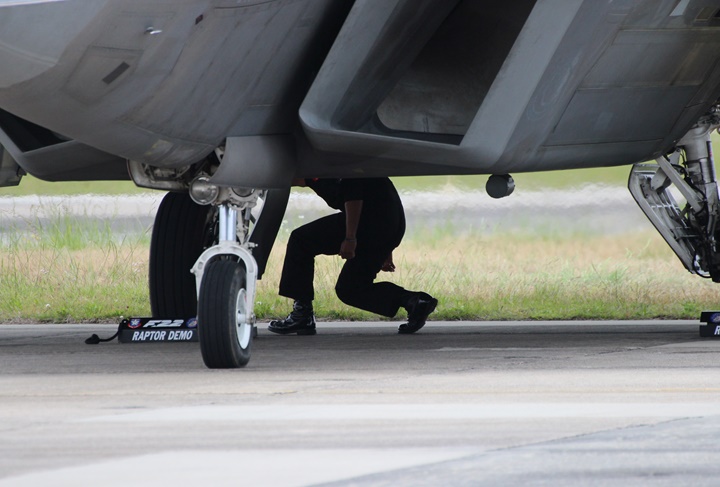
The arms were always to the side of the
body, even when moving under the lowest part of the fuselage.
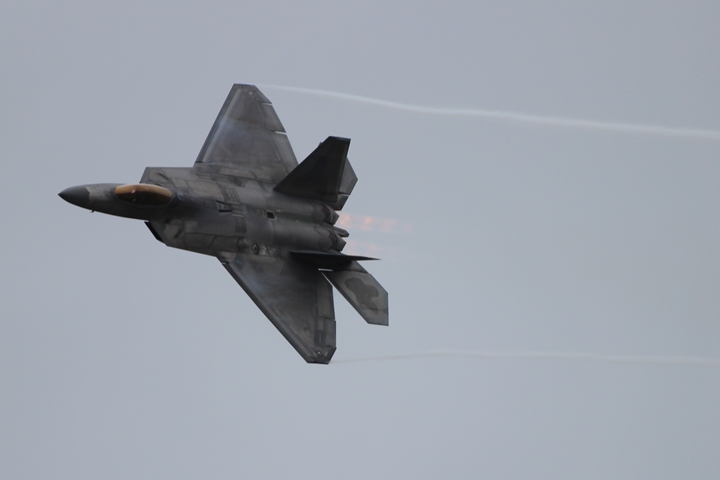
As soon as the Raptor took off, the pilot
determined he did not have the ceiling for his demonstration. But
he had 9,500 pounds of fuel to burn off in order to land within
regulations. The best way to do this was give the crowd multiple
high-speed passes in afterburner.
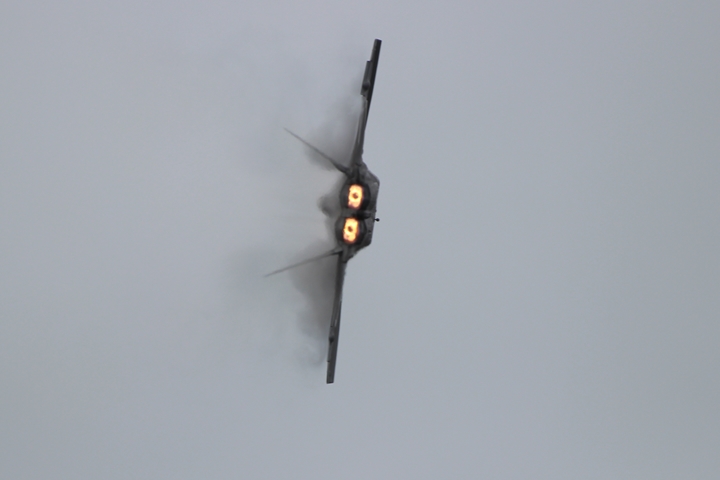
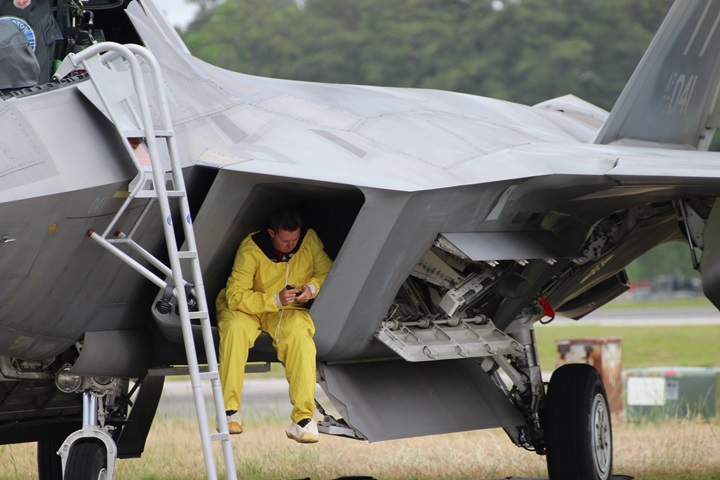
Some time later the engines had to be
inspected.
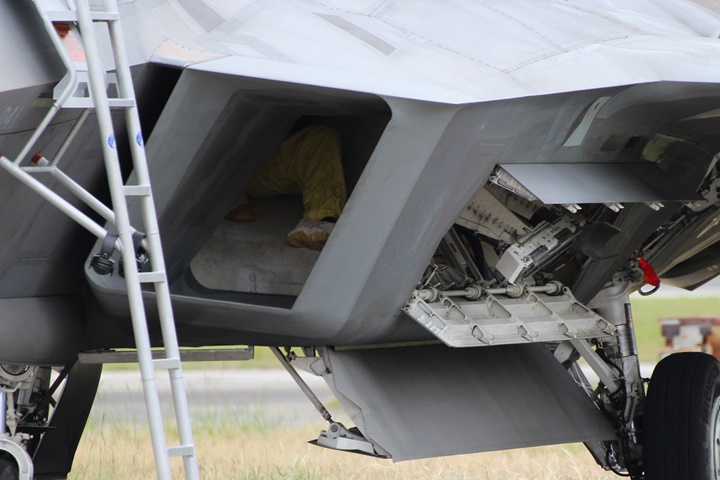
All that can be seen of the crew chief is
his left leg and shoe. This photo also gives a close-up of the
open weapons bay and the ejection rack.
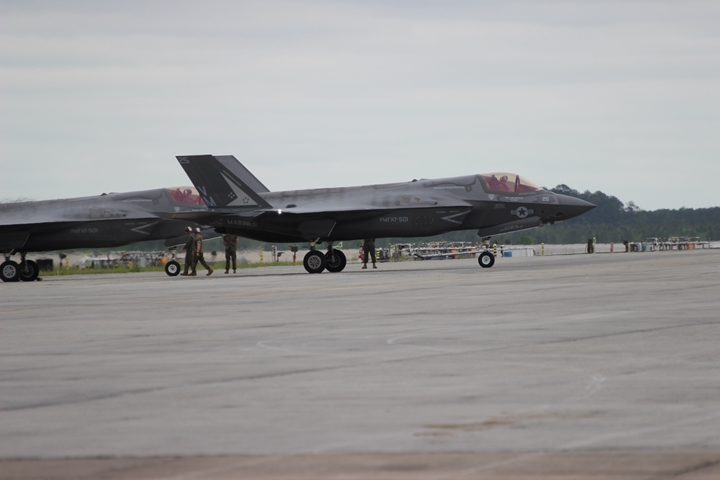
This was the first time I had ever seen any
F-35 taxi. In this case it was the B model operated by Marine
Aviation at Cherry Point. While all demo aircraft bring a second
aircraft as a spare in case of mechanical difficulty, the Marines do not
seem to yet have full confidence in their new F-35Bs. Both aircraft
pictured here were started about an hour before flight time. The
second aircraft did not shut down until after the demo aircraft was
airborne.
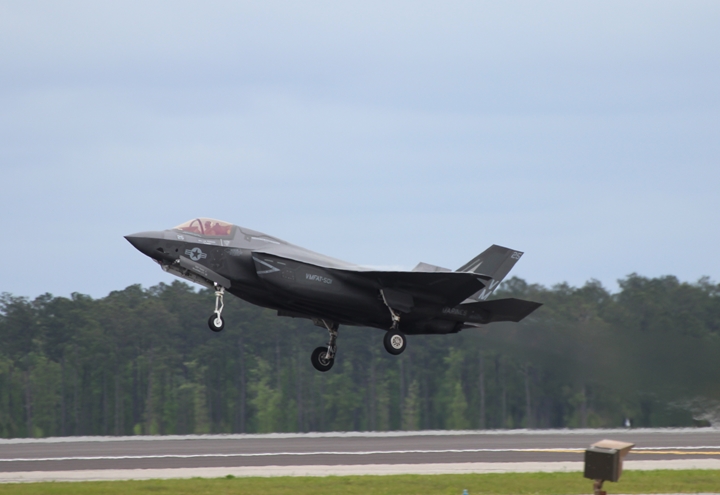
It was the first time I have seen an F-35 take off
and do a demo! Most likely, this is the first time the F-35B has
performed a demo, as the aircraft just became operational with the
Marines in 2015. This was a first for everybody at the show.
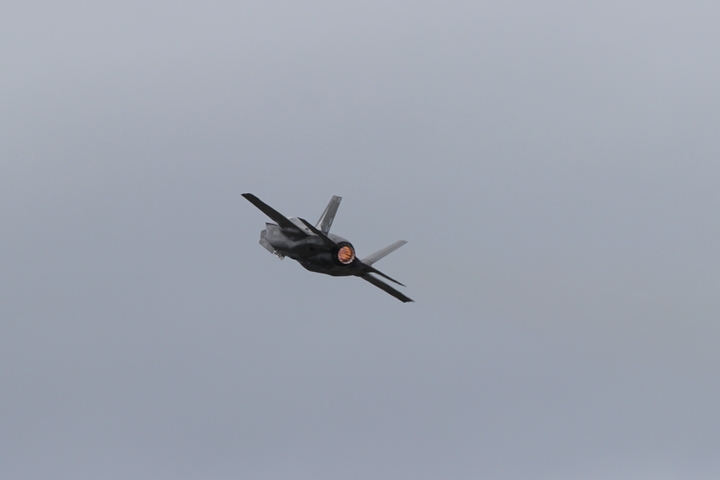
Unlike the AV-8B Harrier, the F-35B has an
afterburner.
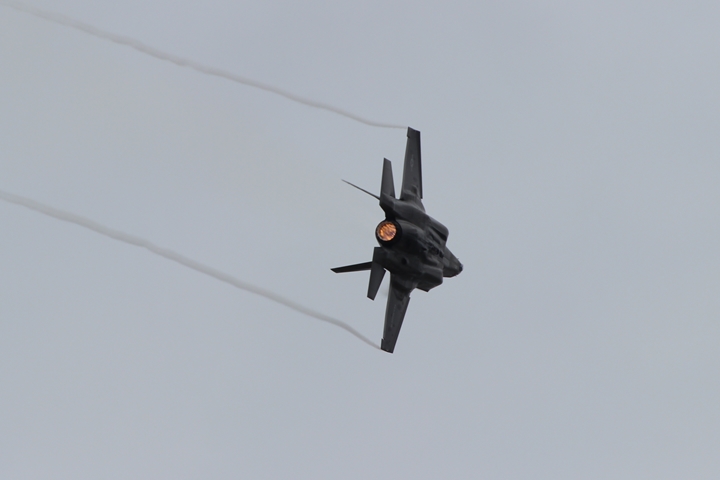
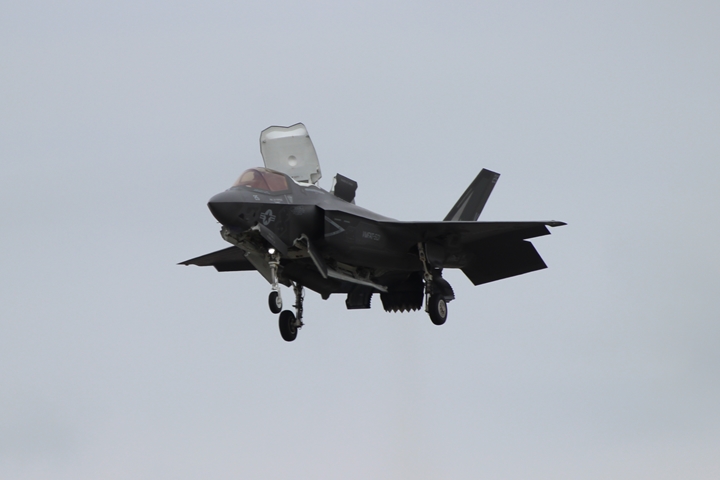
After several high speed afterburner passes,
the F-35B did the routine of stopping in front of the crowd and rotating
about a point. The sequence of events by the F-35B was very
similar to what the Harrier Demo has done over the years.
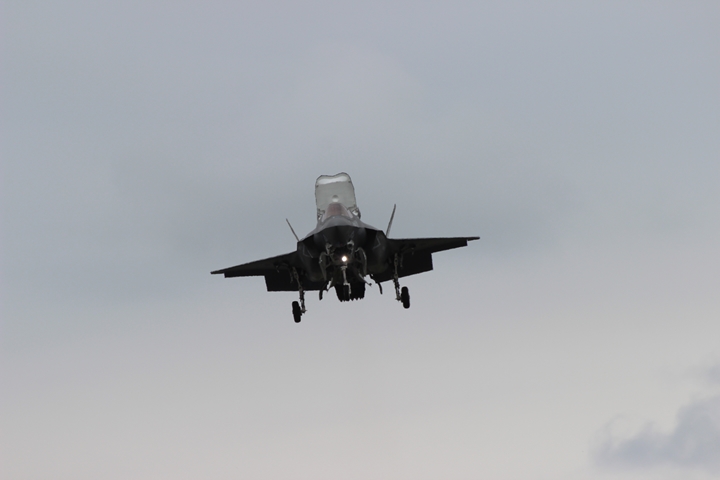
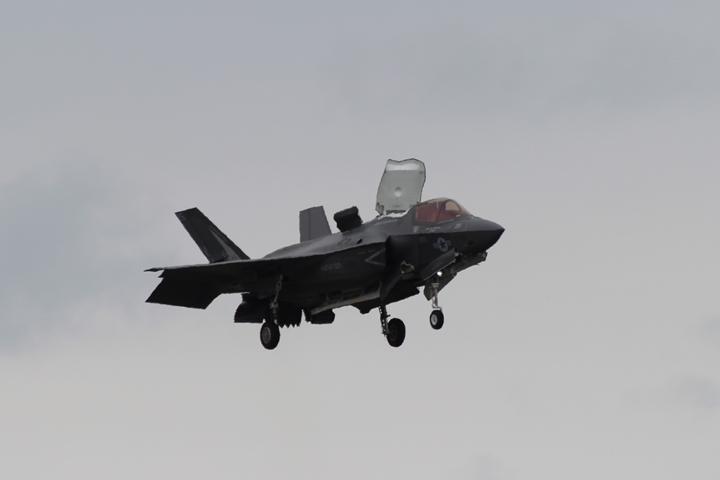
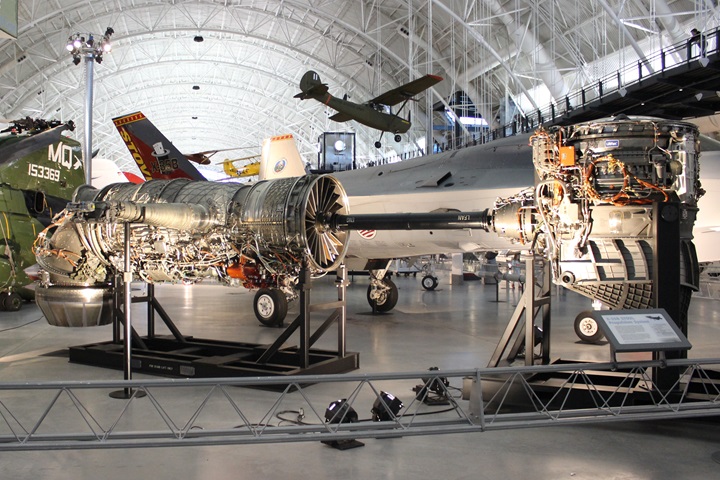
On my trip to the Cherry Point show, one of my
stops along the way was at the Udvar-Hazy Center of the Smithsonian Air
and Space Museum. The power plant of the F-35B is on display, along
with the prototype aircraft. The lift fan at the right is built by
Rolls-Royce in Indianapolis, IN.
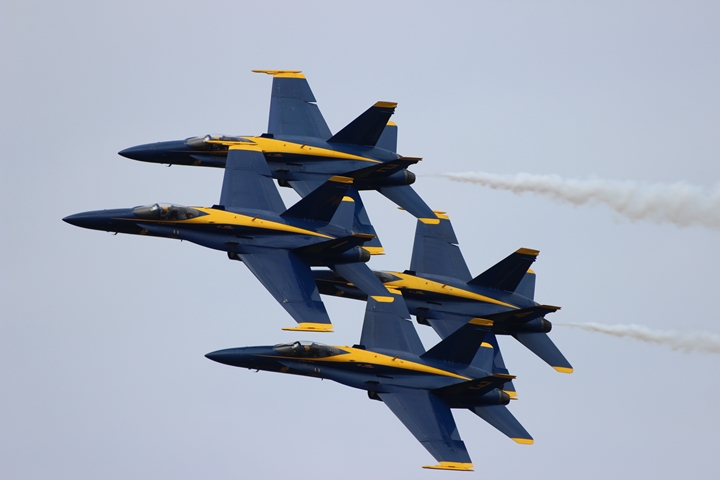
The skies somewhat cleared up somewhat for the Blue Angels at the end of the day,
but they still had to fly their low show, finishing up six hours of
flying. The USMC Cherry Point Airshow, in my estimation, is the
premier military airshow east of the Mississippi River. For
brevity, I have only shown a small sample of the flying during the
course of the day. There were many more acts including the Trojan Horsemen, The Skytypers,
AV-8B Harrier Demo, and the Marine Combined Forces Attack Scenario and a
wall of fire. I have used just a handful of the record 1,600 plus photos
I took for the day.
The biannual airshow is a big deal for the town of Havelock, NC, and the
surrounding area, where Cherry Point is located. Most of the
spectators come in from locations outside of Havelock. At the late
date when I booked my hotel room, I had very limited and somewhat expensive
choices from which to chose. At the show I was parked on runway 5R, of
which about 6,000 feet of the 200 foot wide space was used for parking.
It was completely full and took me three hours to exit. It
took another half hour to go a normal five minute drive back to the
hotel. This was one of two runway parking lots on runways for the show.
Three and a half hours after the show, US-70 was still backed up with
traffic trying to get out of town. There were a lot of people
there!
Side trips on the way to the show.
My shortest route to the show was 860 miles. To
drive all that distance and back for a one day airshow does not make a
lot of sense. This year I added a few miles and a day to the trip,
traveling via the Baltimore-Washington, DC area, to visit several museums outside of
DC. This was in addition to the day along the North Carolina
coast.
North Carolina Maritime Museum in Beaufort,
NC
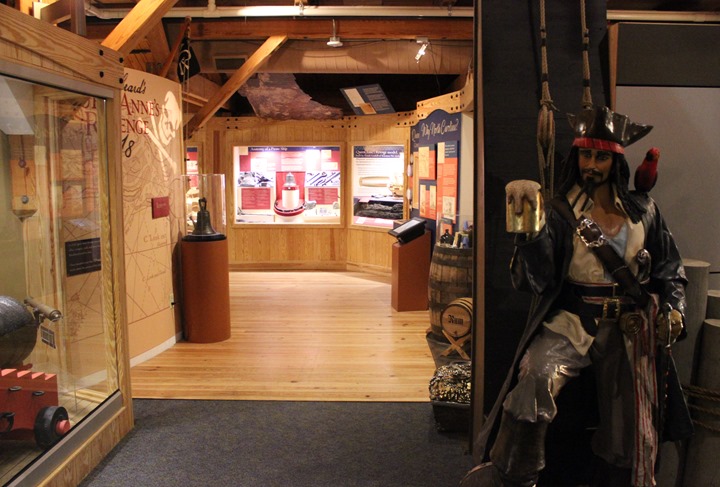
As noted above, the Queen Anne's Revenge
display in Beaufort, NC was instrumental in bringing me to the area for
the airshow. Blackbeard welcomes us into the display with a mug of
rum.
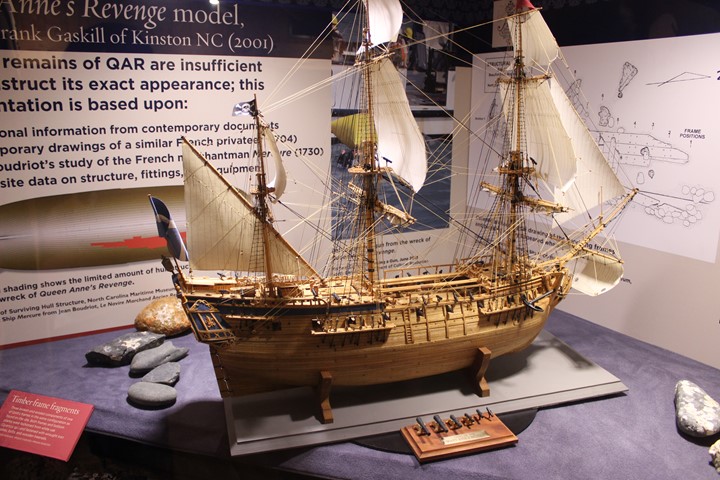
This is a model of the Blackbeard's ship, the
Queen Anne's Revenge. The frigate was built in 1710 for the Royal
Navy and captured by the French in 1711. Used as a slave ship by
the French, Blackbeard captured her in 1717, and then used it as the
flagship of his fleet. He ran it aground 1.25 miles off of the
location of Fort Macon, just across the bay from the museum. The
stones in the photo were used for ballast in the ship.
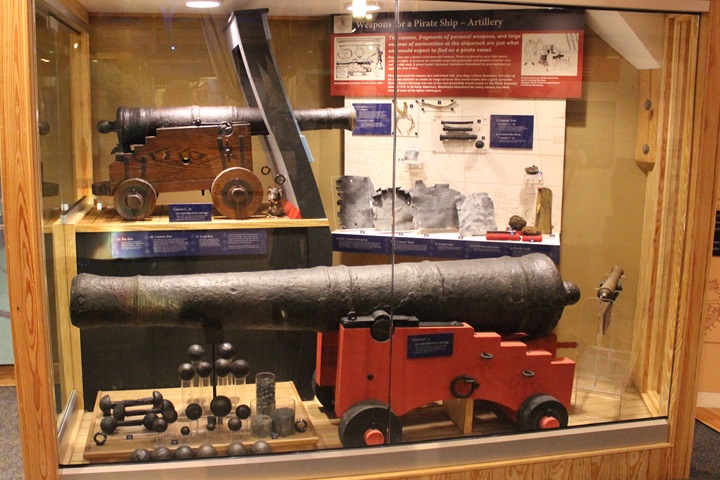
Here are two of the cannons that were
reclaimed from the wreckage site. In 1996 the wreckage was found
by a salvage company. As of 2012, thirteen cannons had been raised
from the wreckage. Another ten had been identified in the
wreckage. The items that look like weight lifting dumbbells were
fired from the cannon into the rigging of target ships to bring down not
only the rigging, but the sails and spars as they tumbled through the
air.
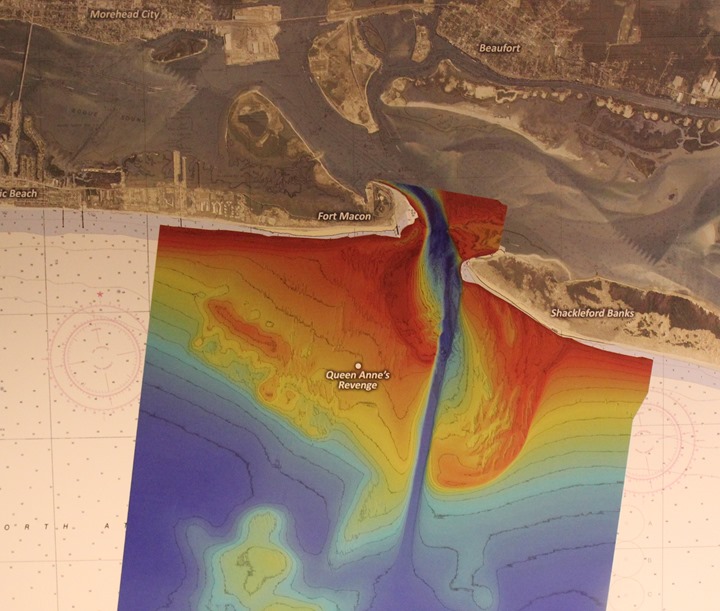
The North Carolina Maritime Museum in
Beaufort is located on the map where the "B" in Beaufort is.
Fort Macon State Park, NC - In the first four days of the trip, the
only sunshine and blue skies I saw was at the fort.
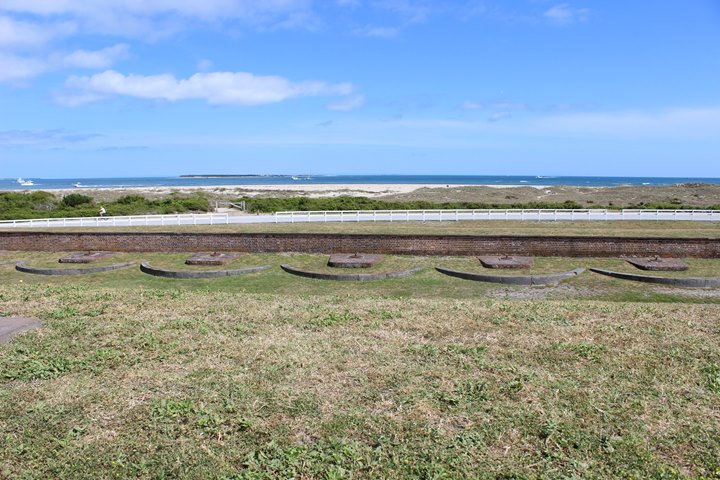
From Fort Macon, Shacklefort Banks are
across the Beaufort inlet. To the far right of the photo is the
area where the Queen Anne's Revenge was found.
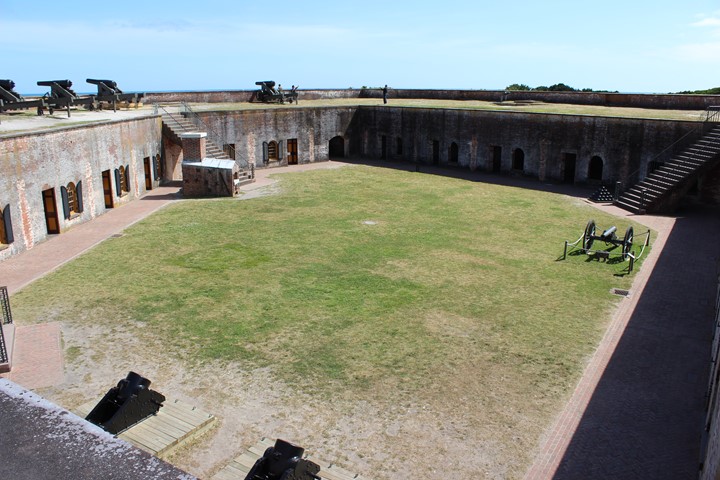
Fort Macon was captured by the Confederate
Forces of North Carolina before the Civil War began. On April
25, 1862 Union forces began shelling the fort from the west were
Atlantic Beach is now located. Note the stone stairs on the right
side of the photo.
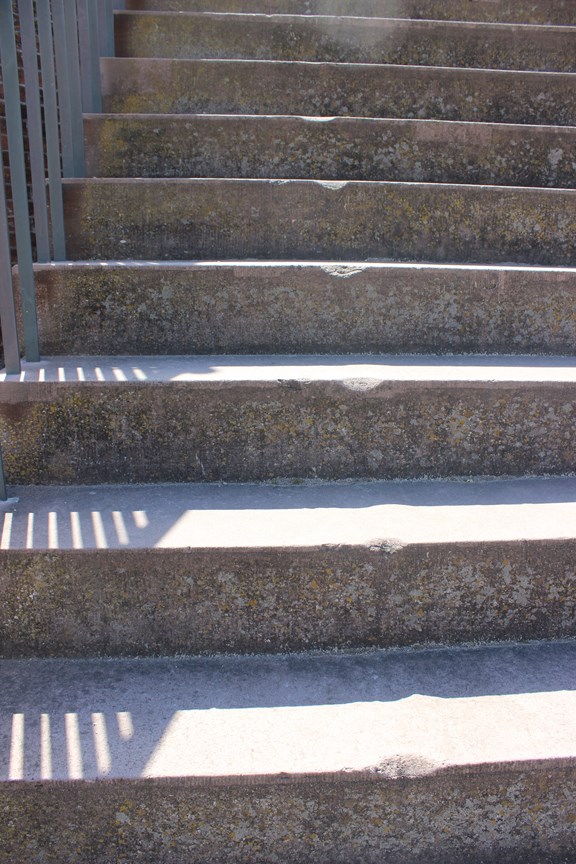
During the bombardment, a mortar shell hit
the stairs.
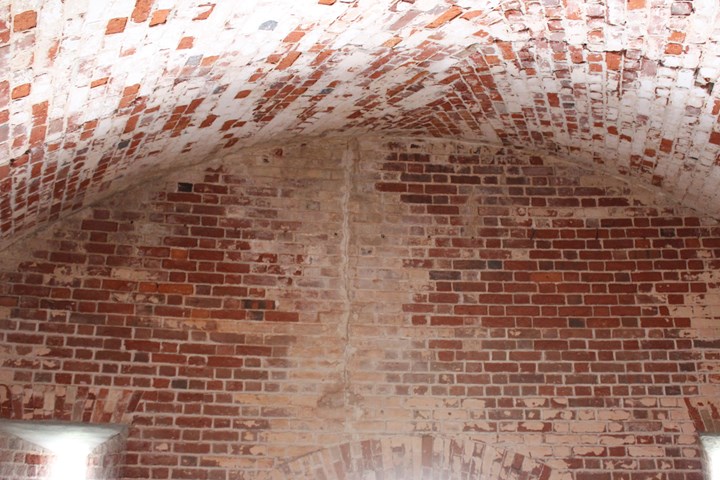
This is the casement directly under the
stairway. There is a repaired crack in the wall and one in the
ceiling. Union Parrot Rifles started to destroy the fortifications
and the integrity in this section of the fort. The fort's powder
magazine is directly to the right in this photo. When the fort
commander was shown the damage, he surrendered rather than have the
powder magazine hit and the entire fort destroyed. He has
previously refused two offers of surrender before the bombardment.
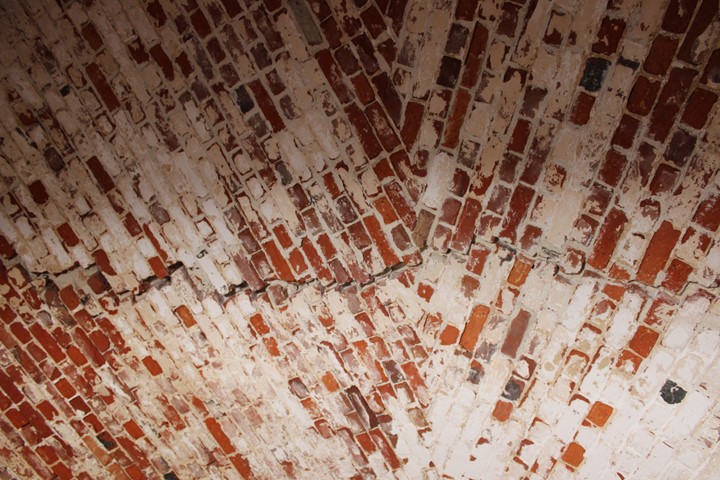
This is the unrepaired crack in the ceiling
of the casement.
Fort Frederick, Big Pool, MD.
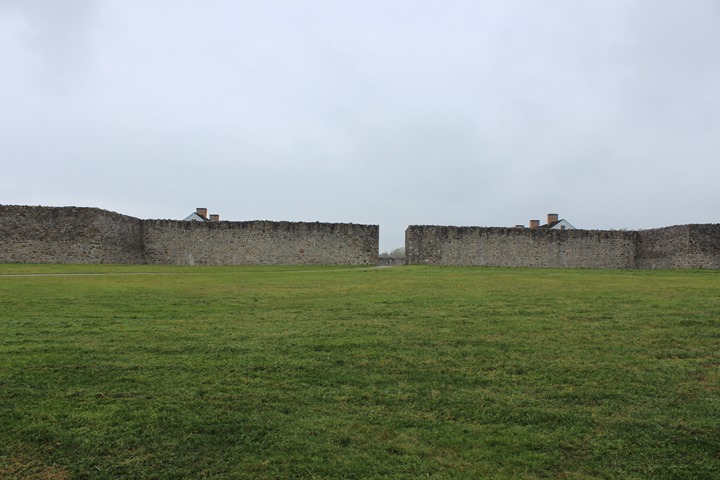
This was actually my first stop of the trip.
This fort is of all stone construction. Most of the fort today is
the original construction from 1754. It was built during the French and Indian War to protect
the western frontier of Maryland. It became a National Historic
Landmark 1974.
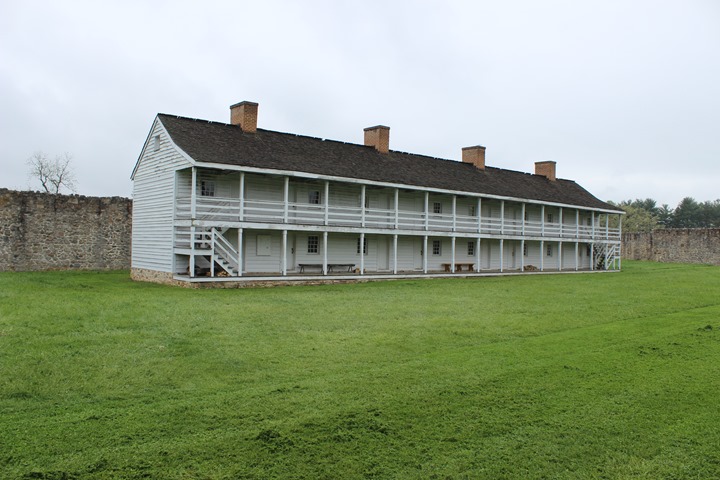
This is one of two barracks open
during the summer months, but not in April. It was raining during my visit. I
need to return on another trip when the weather is more hospitable and
the barracks open.
The Fort is only a mile off of I-68, making it very easy to get to.
The National Cryptologic Museum, Fort Meade, MD
This Museum is part of the NSA complex in the south-west corner of
Fort Meade, MD. I spent a considerable amount of time in the museum looking at all
of the code machines, especially the German Enigmas from WWII, of which
the museum has a complete collection. This museum is like no
other, having codes, cipher sending machines, and cipher de-coding
equipment for its subject matter. For those interested in this subject,
this museum is a must. This is a one-of-kind museum, and is not
well known, like many of those in downtown Washington, DC. In my
opinion, it is a "hidden gem."
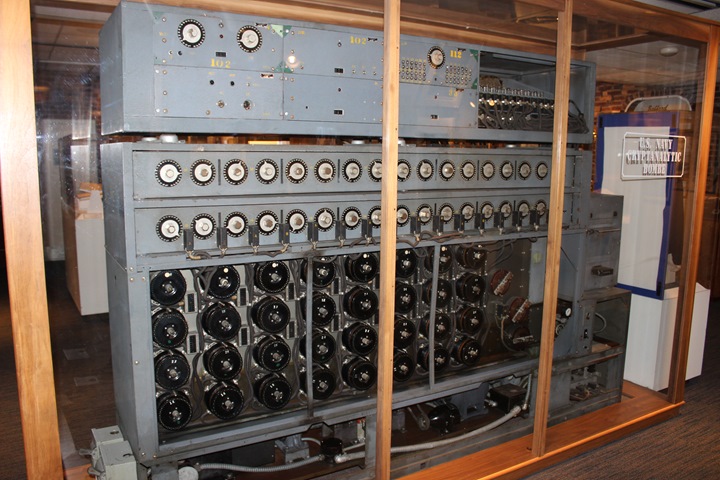
This machine is only survivor of 121 code
breaking machines built for the US Navy during WWII by the NCR Corporation in
Dayton, OH. Called a "bombe", it and the others were used by the
Navy to break the German Navy Enigma codes, the most difficult of the German Enigma codes to break.
The German Air Force and Army Enigma codes were, for the most part, being
read on a daily basis by the British, and later the Americans, during
WWII. This machine was the main reason for me to visit the museum.
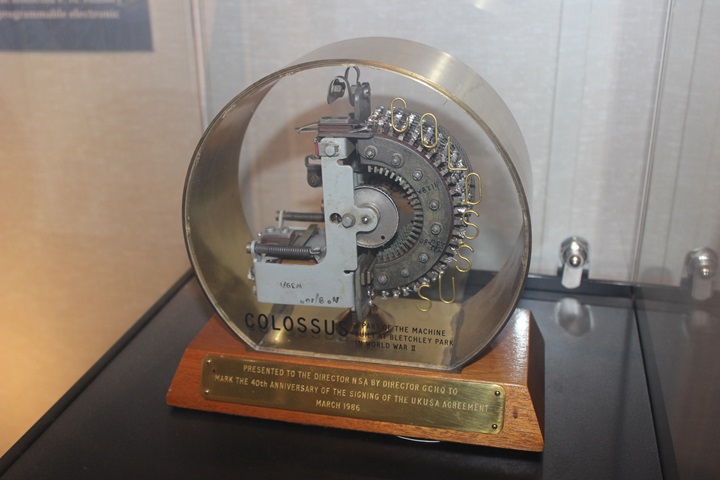
One of the many interesting and
unexpected displays. This is part of Colossus, the first digital
computer that was built to break the German Lorenz SZ40/42 cipher
machine used by the German high command. It was the world's first
digital computer, used by the British at Bletchley Park in England.
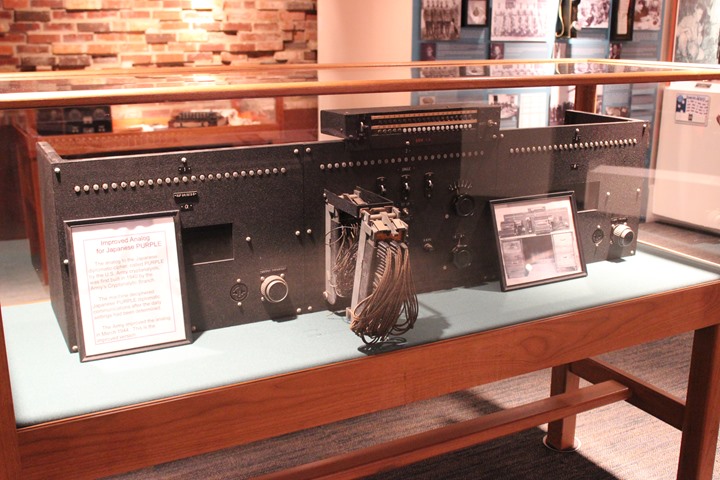
While much of the information is available
on the breaking German ciphers and codes, the work by the US Army and
Navy to break Japanese codes has been forgotten. The Museum has a
whole area dedicated to this subject, which like the work to break
German codes, started long before WWII. This 1944 analog is based
on the earlier 1940 version to read the Japanese Purple diplomatic
codes.
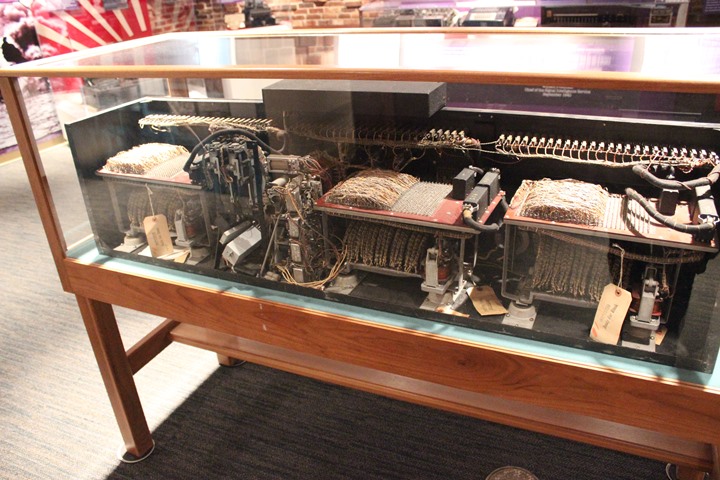
The engineer in me always takes me around to
the back of the machine to see the working part.
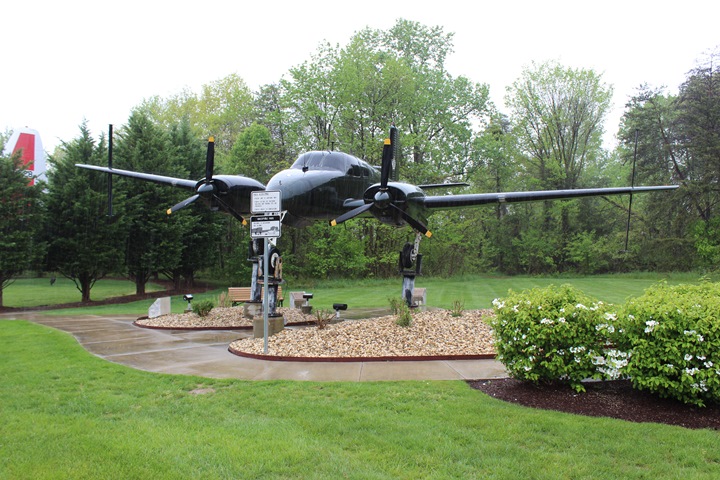
Next to the Museum is Surveillance Park, where
this RU-8D, a C-130 and an EA-3B are displayed. This photo was
taken in the rain. I need to return on a sunny day for better
photos, and to spend more time absorbing all of the information in the Cryptologic Museum.
Knoxville, TN
MCAS Cherry Point, NC
Saint Louis, MO
CFB Trenton, ONT
Thunder Over Michigan, Bellevue, MI
Marion, IN
Waukegan, IL
NAS Patuxent River, MD |


























































